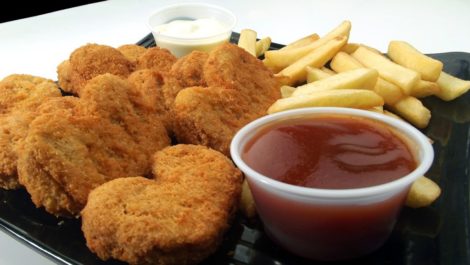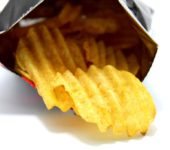I think it’s safe to say that most people already know that eating “junk food” is probably not really a good thing to do. You can show the average five-year-old a bunch of broccoli and a candy bar, and ask her which food is healthier, and she’ll regrettably pick the broccoli (and then take the candy bar out of your hand, run away, and eat it!)
But just how bad is junk food for you really? Do we even know what happens to the body after eating too much junk? A study published in the BMJ just last week aims to answer some of our questions about the harmful effects of a poor diet with some shocking, but not entirely unexpected, results. In order to understand the data, we first need to define the concept of “junk food” as it was used by the authors. This study looked at the worst types of junk that we can eat, the so-called ultra-processed foods. Ultra-processed foods are usually pretty easy to spot…they almost always come in a package of some sort, usually have a long shelf-life, and are often made in a factory. More specifically, ultra-processed foods are defined in this study as mass-produced packaged breads, snacks, confectionary, desserts, sodas and sweetened drinks; meat products such as chicken nuggets, meat balls, fish sticks and the like; instant noodles/soups, frozen ready-to-eat meals, and other food products made mostly of sugar, hydrogenated oils, fats, modified starches, and protein isolates. Often processed foods are deeply chemically processed and have flavoring agents, artificial coloring, and emulsifiers added.
More specifically, ultra-processed foods are defined in this study as mass-produced packaged breads, snacks, confectionary, desserts, sodas and sweetened drinks; meat products such as chicken nuggets, meat balls, fish sticks and the like; instant noodles/soups, frozen ready-to-eat meals, and other food products made mostly of sugar, hydrogenated oils, fats, modified starches, and protein isolates. Often processed foods are deeply chemically processed and have flavoring agents, artificial coloring, and emulsifiers added.
 Now that we have defined the problem, let’s take a second to realize just how much of this stuff most of us eat on a daily basis. How many of these “treats” do we open for ourselves or our children? Look in your pantry or freezer today and I bet there are a bunch of packages of snacks, cakes, muffins, frozen meatballs, chicken nuggets, and desserts in there looking right back at you. How many “foods” do we eat that were shaped by a machine into some pleasing shape and injected with modified fats and preservatives before being deep-fried, flash frozen and shipped out from a factory somewhere?
Now that we have defined the problem, let’s take a second to realize just how much of this stuff most of us eat on a daily basis. How many of these “treats” do we open for ourselves or our children? Look in your pantry or freezer today and I bet there are a bunch of packages of snacks, cakes, muffins, frozen meatballs, chicken nuggets, and desserts in there looking right back at you. How many “foods” do we eat that were shaped by a machine into some pleasing shape and injected with modified fats and preservatives before being deep-fried, flash frozen and shipped out from a factory somewhere?

The study that we are talking about basically followed over 100,000 people (78% women) in France over an eight-year period and monitored their dietary intake of ultra-processed foods amongst other things. They followed these people for the development of cancer until the study period ended in 2017. It’s important to note that they calculated the amount of ultra-processed foods that were consumed by weight (not by calories), which allowed diet sodas and other artificially-sweetened products to still be counted in the overall intake of junk food. The study results were also statistically adjusted for other lifestyle factors such as smoking, alcohol intake, obesity, exercise, and others in an attempt to correct for any confounding variables.
Yes, soda is an ultra-processed food. Diet soda and juices were also counted as junk in the study.
Here is what they found: A 10% increase in the proportion of ultra-processed foods in the diet was associated with a 12% increased risk of developing any cancer. The risk of breast cancer was increased by 11%. For colon cancer (a particular concern to us gastroenterologists), there was a nonsignificant trend towards increased risk with eating ultra-processed foods. Is this conclusion a big surprise? Not really, but this study was the first to actually put some numbers on the risk. I, for one, like numbers when it comes to nutritional advice…it keeps us in the realm of science and hopefully away from veering into pseudoscience territory.
Alright, we get it…eating garbage is bad for your health. Now we know that eating 10% more garbage is associated with increasing your risk of developing cancer by more than 10%. But how might ultra-processed junk foods cause cancer in people? The study authors have a few thoughts on that:
- Ultra-processed foods have poor nutritional quality…lots of sugar and fat, and not much fiber and micronutrients.
- Eating junk food is correlated with obesity, which is correlated with a host of cancers due to many factors. The authors tried to control for this and concluded that the increased cancer risk seen here was not entirely explained by increased body weight. That is, the junk food itself seemed to increase the risk of cancer, regardless of a person’s waist size.
- Excess salt in ultra-processed foods like soups and meat products is associated with an increased risk of stomach cancer.
- Multiple different food additives (colorings, emulsifiers, artificial sweeteners) are associated with cancer, at least in lab animals. We should use caution applying lab animal data to human beings, but should not discount the idea that the cumulative exposure to these various food additives may add up to cause real problems if we eat a large enough quantity of ultra-processed foods over a long enough period of time.
- Carcinogenic nitrosamines found after charring or overcooking meats are associated with various gastrointestinal cancers.
Extreme processing with heat treatment, pre-frying, etc. is associated with the formation of a substance called acrylamide which is associated with kidney and endometrial cancer. - Some of the plastic packaging that ultra-processed foods are stored in for extended periods contain a substance called bisphenol A, which can leach into the food and be ingested, possibly causing endocrine problems that may lead to cancer down the line.
 So what is the bottom line? If we want to take care of our bodies the best we can, we should avoid these ultra-processed foods as much as possible. They are associated not only with high cholesterol, obesity, and high blood pressure, but now also with many different cancers. We should view these “foods” of convenience as what they really are, a shortcut to bad health at the sake of saving a little time. Eating junk food treats our taste buds to a temporary high at the cost of our long-term health. Knowing this, you can still enjoy the occasional doughnut or packaged snack, but this really should be a rare indulgence, not a daily or weekly occurrence.
So what is the bottom line? If we want to take care of our bodies the best we can, we should avoid these ultra-processed foods as much as possible. They are associated not only with high cholesterol, obesity, and high blood pressure, but now also with many different cancers. We should view these “foods” of convenience as what they really are, a shortcut to bad health at the sake of saving a little time. Eating junk food treats our taste buds to a temporary high at the cost of our long-term health. Knowing this, you can still enjoy the occasional doughnut or packaged snack, but this really should be a rare indulgence, not a daily or weekly occurrence.
Patient Newsletter
If you enjoyed this article, please sign up for our free patient newsletter to stay informed about gastrointestinal health and other related topics!
